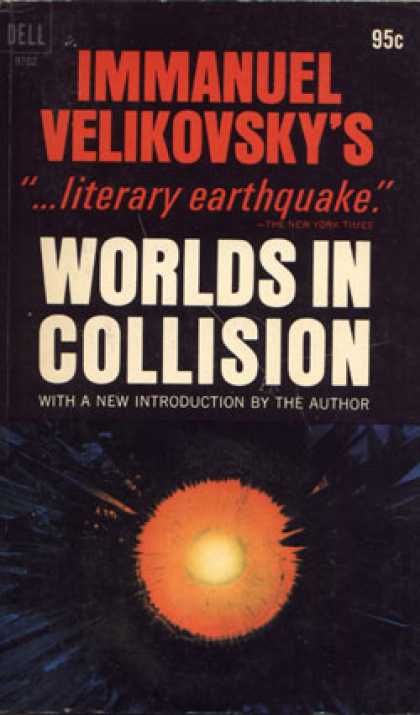I posted a video once about Immanuel Velikovsky, an outsider scientist whose work was impressively elaborate nonsense. A charismatic guy, he befriended some of the greatest minds of the 20th century, including Albert Einstein, Carl Sagan and Freeman Dyson. In Dyson’s recent New York Review of Books piece, he remembers his friendship with Velikovsky. An excerpt:
After I came to America, I became a friend of Immanuel Velikovsky, who was my neighbor in Princeton. Velikovsky was a Russian Jew, with an intense interest in Jewish legends and ancient history. He was born into a scholarly family in 1895 and obtained a medical degree at Moscow University in 1921. During the chaos of the Bolshevik Revolution he wrote a long Russian poem with the title “Thirty Days and Nights of Diego Pirez on the Sant Angelo Bridge.” It was published in Paris in 1935. Diego Pirez was a sixteenth-century Portuguese Jewish mystic who came to Rome and sat on the bridge near the Vatican, surrounded by beggars and thieves to whom he told his apocalyptic visions. He was condemned to death by the Inquisition, pardoned by the pope, and later burned as a heretic by the emperor Charles V.
Velikovsky escaped from Russia and settled in Palestine with his wife and daughters. He described to me the joys of practicing medicine on the slopes of Mount Carmel above Haifa, where he rode on a donkey to visit his patients in their homes. He founded and edited a journal, Scripta Universitatis atque Bibliothecae Hierosolymitanarum, which was the official journal of the Hebrew University before the university was established. His work for the Scripta was important for the founding of the Hebrew University. But he had no wish to join the university himself. To fulfill his dreams he needed complete independence. In 1939, after sixteen years in Palestine, he moved to America, where he had no license to practice medicine. To survive in America, he needed to translate his dreams into books.
Eleven years later, Macmillan published Worlds in Collision, and it became a best seller. Like Diego Pirez, Velikovsky told his dreams to the public in language they could understand. His dreams were mythological stories of catastrophic events, gleaned from many cultures, especially from ancient Egypt and Israel. These catastrophes were interwoven with a weird history of planetary collisions. The planets Venus and Mars were supposed to have moved out of their regular orbits and collided with the Earth a few thousand years ago. Electromagnetic forces were invoked to counteract the normal effects of gravity. The human and cosmic events were tied together in a flowing narrative. Velikovsky wrote like an Old Testament prophet, calling down fire and brimstone from heaven, in a style familiar to Americans raised on the King James Bible. More best sellers followed:Ages in Chaos in 1952, Earth in Upheaval in 1955, Oedipus and Akhnaton in 1960. Velikovsky became famous as a writer and as a public speaker.
In 1977 Velikovsky asked me to write a blurb advertising his new book, Peoples of the Sea. I wrote a statement addressed to him personally:
First, as a scientist, I disagree profoundly with many of the statements in your books. Second, as your friend, I disagree even more profoundly with those scientists who have tried to silence your voice. To me, you are no reincarnation of Copernicus or Galileo. You are a prophet in the tradition of William Blake, a man reviled and ridiculed by his contemporaries but now recognized as one of the greatest of English poets. A hundred and seventy years ago, Blake wrote: “The Enquiry in England is not whether a Man has Talents and Genius, but whether he is Passive and Polite and a Virtuous Ass and obedient to Noblemen’s Opinions in Art and Science. If he is, he is a Good Man. If not, he must be starved.” So you stand in good company. Blake, a buffoon to his enemies and an embarrassment to his friends, saw Earth and Heaven more clearly than any of them. Your poetic visions are as large as his and as deeply rooted in human experience. I am proud to be numbered among your friends.
I added the emphatic instruction, “This statement to be printed in its entirety or not at all.” A quick response came from Velikovsky. He said, “How would you like it if I said you were the reincarnation of Jules Verne?” He wanted to be honored as a scientist, not as a poet. My statement was not printed, and Peoples of the Sea became a best seller without my help. We remained friends, and in that same year he gave me a copy of his Diego Pirez poem, which I treasure as the truest expression of his spirit. I hope it will one day be adequately translated into English.•
Tags: Freeman Dyson, Immanuel Velikovsky

